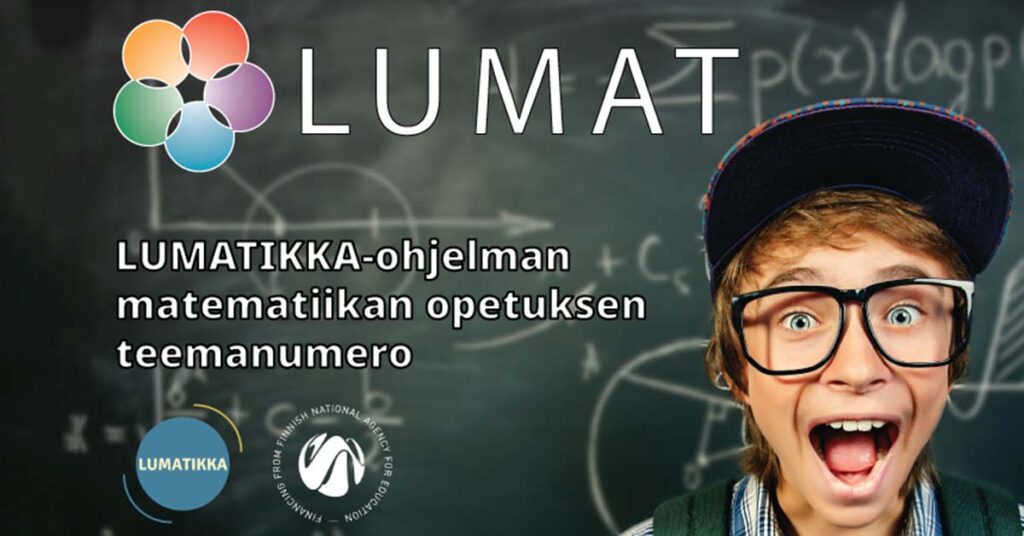Contents
- Director’s review
- National task
- Collaborative projects
- Publications and reports
- Reach of operations
- Network events
- Communications
- A brief overview of the year 2022 at the regional LUMA Centres
- Contributors to the operations
1. Director’s review
The year 2022 was thriving. In spite of the pandemic period, the jointly set goals for our national tasks were achieved very well. Based on collaboration and research, we developed new initiatives and materials from early childhood education to higher education, spreading them in various ways across Finland. In particular, new virtual modes of action (e.g., remote study visits, online courses, videos and TikTok) attracted new children and adolescents with their families, as well as current and future teachers and instructors from all over the country. Some 60 LUMA learning communities have actively participated in the operations throughout Finland, with LUMA activities reaching during the year a total of approximately 412,000 individuals, of whom 82,000 were in Finland.
Skilled teachers are at the core of our operations, and they are key to a good and sustainable future. With funding from the Finnish National Agency for Education, we carried out a number of education activities under the LUMATIKKA, LUMAn lumoa and Ulos luokasta projects in support of curricula around Finland. We organised the national LUMA Days collaboratively at Aalto University, which were hugely popular. The national LUMA Weeks is an important national event every year.
We also contributed to the preparation of the implementation plan of the national STEM strategy of the Ministry of Education and Culture in collaboration with the National LUMA Advisory Board. The implementation plan was published in early 2023. We continued our research-based operations with the national and international events of the LUMAT Science Research Forum. In addition to our international scholarly LUMAT journal published since 2013, the forum organised LUMAT seminars, the LUMAT summer school and the LUMAT Research Symposium online.
LUMA science education is also becoming an established part of higher education. In 2022 several STEM-themed theses and publications were completed at various universities. Many universities have good models for how students serve as ambassadors for science through various activities as part of their education.
Internationally, our LUMA model of science education elicits interest around the world. University experts actively contributed to international activities as lecturers, hosts and partners. International collaboration was conducted with, for example, the IDoS network, the Science on Stage Europe initiative and the EU STEM Coalition. A warm thanks to university leaders, operators, partners and funders for their excellent cooperation in the past year. United for a good and sustainable future! Science is for everyone.
Kind regards Maija Aksela
Director of the LUMA Centre Finland network
Professor of Science Education
University of Helsinki
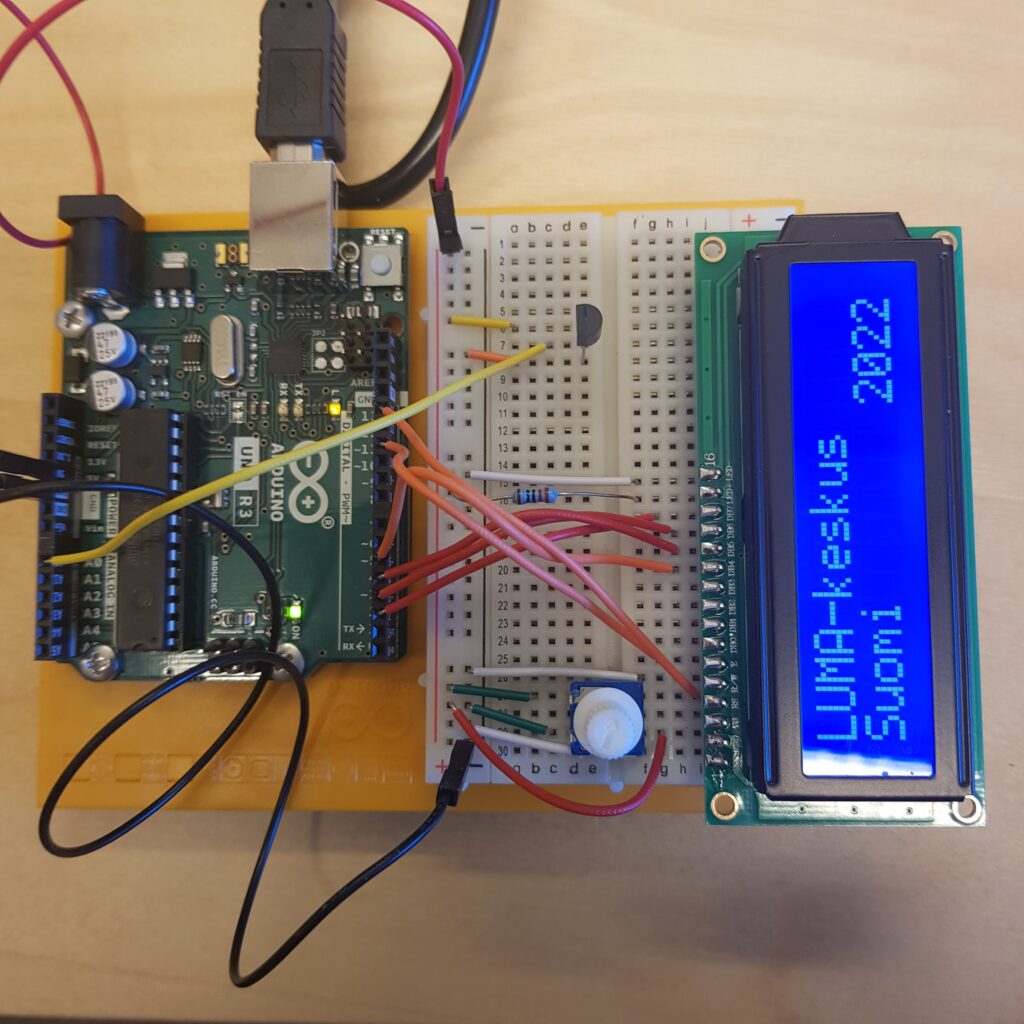
2. National Task
The Ministry of Education and Culture awarded LUMA Centre Finland funding for its national task for the period 2021–2024. The funding is aimed at securing a high level of mathematical, scientific and technological expertise as well as a sufficient number of experts in Finland. The board and coordinators of LUMA Centre Finland determined three key operational measures to carry out the national task in the period. The implementation of the measures will be reviewed annually at the network’s development seminar and adjusted for each subsequent year.
Supporting teachers’ continuous learning
In 2022 LUMA Centres supported curriculum implementation at schools and early childhood education units in a number of ways, including by offering teaching equipment for loan, developing learning materials and organising study visits both on-site at university premises and online.
A new initiative in 2022 was to plan and streamline the operations of the LUMA learning community. Over the course of the year, LUMA learning community convened for two seminars, in addition to which four theme groups held their own monthly meetings online. In the spring, new schools and daycare centres were also selected for LUMA learning community. Dozens of daycare centres and schools from all over Finland participated in the theme groups, with roughly 120 teachers or instructors participating during the year.
- The group for higher education, researcher and business collaboration included 14 learning communities.
- In the group focused on nature as a learning environment, there were 21 learning communities.
- The group for technology education, programming and mathematics included 10 learning communities.
- The group for project-based learning and models that support inclusivity included 18 learning communities.
The most challenging of the goals set for 2022 was finding an open national material bank suited to the materials produced and distributed by the network. While a suitable platform is yet to be identified, the goal was chosen as a development target for 2023.
Strengthening mutual collaboration between universities and collaboration outside the network
In 2022 the network’s internal collaboration was intensive, with joint projects successfully carried out. There was continuous discussion and communication within higher education institutions. In fact, this is the only way to keep knowledge of the forms of LUMA activities topical and sustainable. In the internal communications of higher education institutions, information was exchanged on, for example, models and research in teacher training. At the universities, models were tested to deploy LUMA activities to teacher students through courses, lectures or training locations.
Over the course of the year, the activities reached some 500 university students who took LUMA courses. International networking and the visibility of LUMA activities in society were also considered important. In 2022 LUMA activities were presented a total of 29 times at various events and conferences to international and domestic audiences, which numbered in the thousands.
Extending the reach of leisure time LUMA activities for children, adolescents and families
Leisure time activities were developed at various locations in Finland. New concepts to be highlighted include collaboration with libraries, such as science education organised in libraries and LUMA equipment available for loan from libraries. The Finnish national model for leisure activities has also become a functional form of action in municipalities. The virtual camps and clubs developed during the pandemic have been established as part of the operations of the LUMA Centres, and they were extremely popular also in 2022.
3. Collaborative projects
As in previous years, LUMA Centre Finland was responsible for a number of successful projects.
LUMATIKKA
LUMATIKKA, a continuing education project focused on the teaching and learning of mathematics and funded by the Finnish National Agency for Education, was concluded at the end of 2022. The supervised online courses in 2022 and the training organised alongside them attracted nearly 3,000 participants, while the entire project reached more than 7,000 Finnish- and Swedish-speaking participants across Finland. The entire 15-credit programme was completed by 10% of the participants. In addition, the high-quality instructional videos produced in connection with LUMATIKKA training were viewed more than 100,000 times. Interest in the continuing education initiative in mathematics is evidenced not only in statistics, but also in a slew of positive course feedback and discussions on social media on teacher forums.
As a result of the collaboration established in teacher training during the supervised project period, it was possible to record completed LUMATIKKA courses in the student registers of the University of Helsinki and Åbo Akademi University. The collaboration between faculties and higher education institutions was productive, as five of the courses were successfully integrated into the teaching offerings of the Faculty of Educational Sciences at the University of Helsinki and one into those of the Faculty of Education and Welfare Studies at Åbo Akademi University. In addition to LUMATIKKA courses, the project collaborated with other parties, including the City of Lappeenranta and OSAKE, the Tampere region service unit for the development of the education sector.
In the summer of 2022, the providers of LUMATIKKA continuing education produced a thematic issue on teaching in mathematics for the LUMAT-B journal. In the autumn of 2022 teaching materials produced during the project by experts in the field of education were openly distributed online to all. Video libraries were compiled under the YouTube channel LUMATIKKA. A total of 28 material collections were compiled of teaching videos, ideas and other written course materials for the Library of Open Educational Resources (OER) service. Because of the shutdown of the system, the supervised courses in the mooc.helsinki.fi service were transferred to the DigiCampus learning environment as self-access courses. Research data from the old course areas were stored for later use. The project achieved and even exceeded all of the goals set for it.
LUMAn lumoa
The Finnish National Agency for Education granted LUMA Centre Finland a state grant for staff training in education and early childhood education in 2021–2022. The funding was used to create the LUMAn lumoa: Eheyttävää ja laaja-alaista opiskelua ja opetusta monimuotoisissa oppimisympäristöissä (‘The charm of STEM: Integrative and broad-based learning and teaching in diverse learning environments’) learning module for the DigiCampus online course platform. The project was launched in September 2021, and all training elements were opened for completion in early 2022. A total of 347 teachers took part in the training during the year. The project was granted an extension, with the training elements continuing in 2023.
Ulos luokasta
In early 2022 the Finnish National Agency for Education granted LUMA Centre Finland a second state grant for staff training in education and early childhood education. The Ulos luokasta – Innostavaa opiskelua monimuotoisissa oppimisympäristöissä (‘Out of the classroom – Inspiring studying in diverse learning environments’) project is to be implemented in 2022 and 2023. The project focuses on three online course extensions and several on-site training offerings across Finland. The design and implementation of the online course extensions were largely completed in 2022, and the courses as well as the on-site training options were made available to the target groups in early 2023.
StarT
In the period 2021–2023, a total of 857 projects by children and adolescents and 753 good teaching practices by teachers were seen at StarT Festivals, workshops and training sessions as well as in three competitions. Sharing the joy and practices of learning were 1,495 learning communities, or more than 7,650 teachers as well as 325,120 children and adolescents.
The main events in spring 2022 were the national and international StarT Competitions. In May a public vote was held in connection with the StarT Competitions. The vote was based on video presentations of competition entries, which voters were instructed to view through the StarT blog and YouTube channel. A total of 85,017 people participated in the international vote, while the corresponding figure for the national competition was 1,058. The international StarT Gala, an award ceremony serving as the culmination of the term, was organised both as a virtual live stream and on site at Otaniemi Campus on 13 June as part of the national LUMA Days.
As for the StarT Festivals organised by LUMA Centres, they are diverse science and technology events, through which StarT participants can share the joy of learning as well as their good ideas and practices. The festivals were held partly as live events, party over remote connections. In the period 2021–2022, StarT Festivals were organised by the LUMA Centre of Ostrobothnia, Luma Centre Lapland, and Junior University at LUT University and the LAB University of Applied Sciences. From among the international partners, China and Lithuania organised festivals.
In autumn 2022 the StarT programme was redesigned. The international StarT Competition was no longer organised, and it was replaced with an international model for teacher cooperation for 2022 and 2023. The model is aimed at the establishment of new teaching practices in support of teachers and educators involved in international collaboration. From Finland, eight daycare centres and schools registered as partners. Among the international partners were teachers from four countries. The participants will be divided into pairs according to specific interests, and they will have the opportunity to collaboratively design new teaching practices in line with the model.
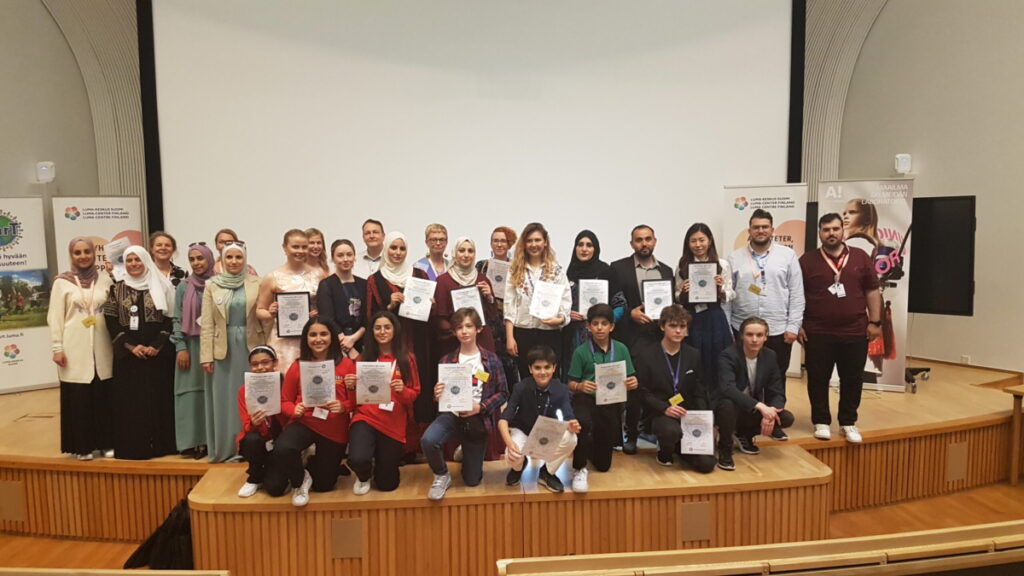
Winners of the StarT Competition from several years in the pandemic period were finally able to travel to Finland for the LUMA Days in Otaniemi in June 2022.
4. Publications and reports
A number of research articles, reports and news items were published during the year, including the following publications:
- Uusi-Kilponen, A., Hietakymi, E., & Toikka, S. (eds.). (2022). LUMATIKKA-ohjelman matematiikan opetuksen teemanumero. (LUMAT-B: Vol 7, No. 2).
- Ikävalko, T., Vuorio, E. S., & Aksela, M. (2022). Lukioiden rehtorien näkemyksiä lukio-korkeakouluyhteistyöstä: Mahdollisuudet, haasteet, ratkaisut ja tuen tarve. (General upper secondary school principals’ views on collaboration between general upper secondary schools and higher education institutions: Opportunities, challenges, solutions and the need for support’, in Finnish only). (Reports and surveys; Vol. 2022, No. 2). Finnish National Agency for Education.
You can explore the rest of our publications in 2022 on our website (in Finnish only).
5. Reach of operations
In addition to funding granted by the Ministry of Education and Culture for the completion of its national task, the funding of the LUMA Centre Finland network and its centres comprises funding granted directly by the participating universities and, for example, the support provided by businesses. LUMA Centre Finland also receives funding, for example, from the Finnish National Agency for Education for continuing education projects. The table below summarises the key figures related to the overall reach of the LUMA Centre Finland network and regional LUMA Centres. During the year, our operations reached a total of approximately 412,000 people, of whom 82,000 are in Finland. Our target groups include teachers of different educational levels as well as children and adolescents.
The reach of support for the high-quality implementation of curricula in 2022
- 33,415 children and adolescents attended workshops or events as part of the school day
- 23,730 children and adolescents visited LUMA Centres on study visits
- 235 young people took part in university or online courses
- 104 TET work try-out participants
- 4,337 Finnish teachers and pupils participated in the Finnish science competition
- 7,186 loans of teaching equipment or material
- 3,216 representatives of higher education institutions visited schools and daycare centres
- 3,467 Finnish and 255 international teachers attended continuing education
Reach of leisure time activities in 2022
- 950 children or adolescents participated in clubs and virtual clubs
- 678 children or adolescents participated in camps and virtual camps
- 1,550 children participated in science-themed parties
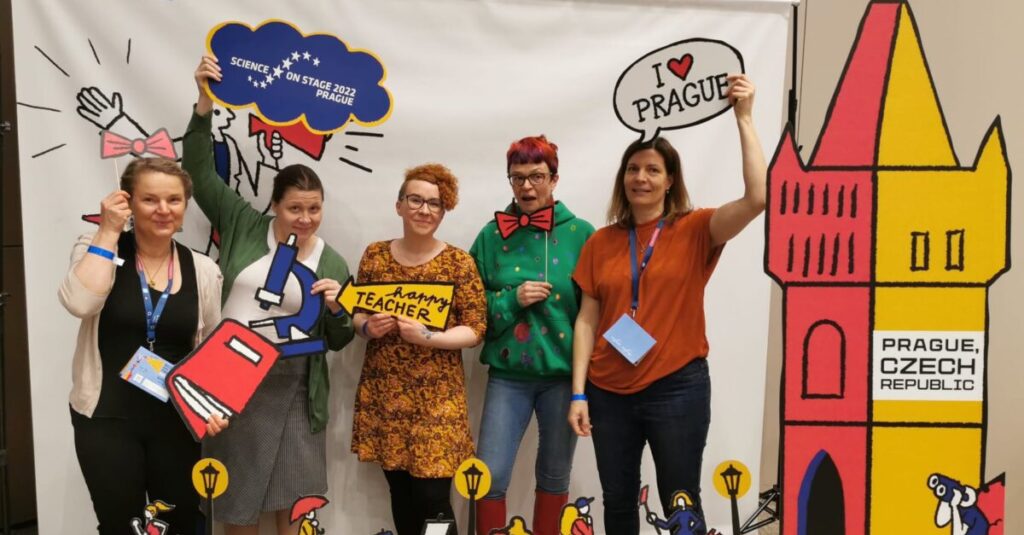
At the Science on Stage festival in Prague, Finland was represented by Kirsi Rehunen, Outi Haatainen, Maikku Aho, Teija Lauronen and Nina Pakarinen. The 2024 Science on Stage festival will be held in Turku.
6. Network events
LUMA Weeks were held from 14 January to 13 February, with STEM and creativity as the theme for 2022. Over the weeks, the network distributed, among other things, ready-made materials, event tips and ideas for organising LUMA Weeks in schools and daycare centres throughout Finland.
Following the pandemic, the national LUMA Days were finally held on 13 and 14 June 2022 on location at the facilities of Aalto University in Otaniemi, Espoo. The event also hosted the LUMAT Research Symposium and LUMAT Summer School focused on science education research. The lectures and workshops organised during the two days garnered a total of 285 people interested in teaching and related research.
LUMAT research seminars were held over remote connections three times in 2022, with presentations focused on, among other topics, flexibility, support for learning mathematics, and digital skills.
The Board of LUMA Centre Finland, the highest decision-making body of the network, convened four times over the course of the year. The National LUMA Advisory Board, which serves as the advisory discussion forum for the Board of LUMA Centre Finland, convened twice. In its meetings, the advisory board discussed, among other topics, the implementation plan of the national STEM strategy. In addition, the operators of LUMA Centres held regular, monthly remote meetings. Besides the meetings, the entire network convened in Helsinki in November for a development seminar to review the past year and to set new goals for the following year.
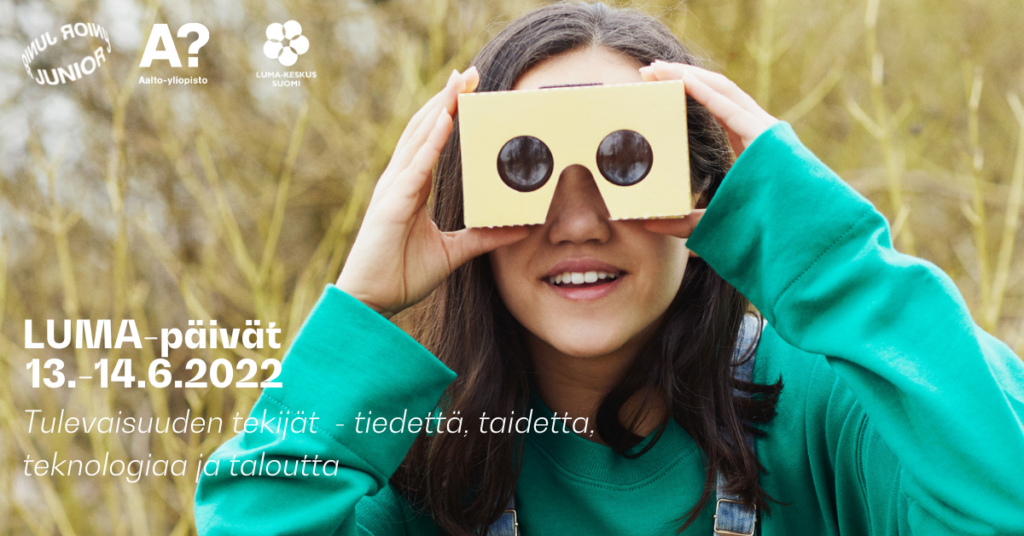
In 2022 the National LUMA Days were held at Aalto University under the theme of Teachers of the Future – Science, Art, Technology and Economy.
7. Communications
A communications team composed of communications coordinators from LUMA Centres, which supports the LUMA Centre Finland communications specialist, organised meetings and training at regular intervals throughout the year. More than 30 Fie publications were published in the LUMA magazine on the luma.fi website. The most popular content on the website covered the LUMA Days, the LUMAn lumoa training and digital learning materials.
The number of followers of and likes on social media channels continued to grow: Instagram (+203 followers), YouTube (+93 subscribers), Facebook (+86 likes). The reach of the Facebook page during the year was 46,343 visits (+114.2%) and that of the Instagram account 4,505 (+57.6%).
The LUMA newsletter reached thousands of readers in 2022, with a better average click-to-open rate than in the previous year: 38.6% (+8.8%). Moreover, an increase of 14.7% was seen in the click-through rate compared to 2021 (+5.6%). The number of newsletter subscribers grew during the year.
In 2022 there were three highlights in the operations of the LUMAT journals, the first of which relates to staff changes. After 10 years in the position of editor-in-chief, Professor Maija Aksela became an honorary member of the steering group. University Lecturer Johannes Pernaa assumed the duties of the editor-in-chief as of 1 August 2022. The following highlights are associated with the publication of special issues. On 30 June 2022, the LUMAT-A journal published an issue entitled Mathematical Thinking and Understanding in Learning of Mathematics, edited by Jorma Joutsenlahti and Päivi Perkkilä. On 7 June 2022, the LUMAT-B journal published an issue on teaching mathematics in the LUMATIKKA initiative, edited by Alisa Uusi-Kilponen, Eveliina Hietakymi and Susanna Toikka.
8. A brief overview of the year 2022 at the regional LUMA Centres
Aalto University Junior
For Aalto University Junior, the year was a record-breaking one. After the coronavirus restrictions were lifted, operations were expanded to their full form. Over the course of the year, scalable practices of a high standard reached more than 28,000 children, adolescents, teachers and parents. The figure encompasses active participants in supervised workshops, events, camps, clubs and other similar activities. An enormous number of working hours were spent at Aalto University Junior in the pandemic period to make the services available on a national scale. This bore fruit, as people from nearly all corners of the country, roughly 150 municipalities, took part in the activities over the year. The hybrid model is here to stay in the operations of Aalto University Junior.
The highlights of the year included a theme week for Scratch programming (3,500 participants, with a total of more than 11,000 participants in all theme weeks), on-site and remote study visits (almost 9,000 participants), the Takeoff entrepreneurship event for general upper secondary school students (2,300 participants) and the first STEAM-themed collaborative artwork in the Cooler Planet exhibition, which was part of Helsinki Design Week. Collaboration with Lasten uutiset, the children’s news section of the Helsingin Sanomat daily, and the Huvudstadbladet Junior magazine for children gained media coverage. Aalto Yliopisto Junior published a number of Try at home instructions and videos on the Lasten uutiset YouTube channel. The activities were guided by the principles of equality and social justice – the desire to reach children and adolescents from different backgrounds, as well as those who have no natural connections to the university. For example, the summer camps had a quota for children arriving from the SOS Children’s Villages organisation. In addition, extensive event collaboration was conducted with a number of cultural organisations, cultural centres and other operators active in the field of education.
Science education at the University of Helsinki
In 2022 a total of 265 groups and 5,504 learners from different levels of education attended science education classes at the University of Helsinki. A total of 75 remote study visits were held across Finland, with sessions in geography being particularly popular. During the year, new opportunities for getting to know the University were developed, particularly for upper secondary education, including a virtual adventure and an introductory tour entitled Tieteen kilpajuoksu (‘Science race’) on Kumpula Campus.
LUMA Centre of the University of Eastern Finland
The Tiedetuokiot (‘Science moments’) concept developed for leisure activities can be considered one of the highlights of the year. In 2022 the LUMA Centre of the University of Eastern Finland organised these hour-long sessions, targeted at primary school-age children, once a month at the library. Each session had its own topic, and the children had the chance to get to know STEM topics in a relaxed setting. Another event marking the year was the appointment of a new LUMA coordinator in August, as a result of which the centre’s operating methods were updated. At the end of the year, closer collaboration with the teacher training unit was resumed. The aim of the collaboration was to increase LUMA activities in the teacher training provided by the University of Eastern Finland.
LUMA Centre of Central Ostrobothnia
The 10th anniversary of the LUMA Centre of Central Ostrobothnia was celebrated on 5 November. The operations were launched in 2012 under the administration of the Centria University of Applied Sciences, with the responsibility transferred to the Kokkola University Consortium Chydenius immediately the following year. Collaboration with Centria has always been intensive, for example, in the form of study visits. As a sign of continual cooperation, the Kokkola University Consortium and the Centria University of Applied Sciences concluded a collaboration agreement in spring 2022. As a result of the agreement, the coordination of LUMA activities between the institutions will intensify, and new forms of collaboration will be developed.
Regional LUMA activities also gained more support when the composition of the centre’s steering group changed, and the group had the opportunity to convene after a long hiatus. The anniversary was marked by a considerable revival of regional activities, as, among other things, an upward trend was seen after the pandemic in the lending of LUMA equipment and learning community visits.
Central Finland LUMA Centre
The absolute highlight of the year were the multidisciplinary science education efforts carried out with the JYUniorit team, to which the Central Finland LUMA Centre provided STEM expertise. The collaboration resulted in the organisation of several larger events and the establishment of multidisciplinary children’s Science Saturday activities. The Central Finland LUMA Centre organised a total of five of these events as part of the Tiedettä kaikille (‘Science for all’) concept of the University of Jyväskylä.
Another highlight was the LUMA Day organised for the immigrant community, with the goal of reaching a new target audience. A student from the Humak University of Applied Science completing their traineeship at the Central Finland LUMA Centre contributed to the organisation of the event. The third highlight was the development of subject teacher training, including a course entitled First Steps to Teaching for teacher students studying at the Faculty of Mathematics and Science.
LUMA Centre of Southwestern Finland
The Mathematical Mysteries video series triumphed in the category for the most innovative children’s film at the international Helsinki Education Film Festival. A pupil completing their TET work try-out period at the Faculty of Science contributed to writing a published paper on mathematics. The new workshops for schoolchildren were completed and launched. In addition, the LUMA Centre of Southwestern Finland was featured in a number of events, including a science stand at the anniversary week of the Mylly shopping centre.
LUMA Centre Lapland
The regional StarT Festival and the Science Week for schools, both annual events, attracted large audiences. With the exception of two municipalities, the virtual StarT Festival reached the entire region of Lapland. The Science Week for schools, organised in cooperation with the Arctic Centre, introduced science education to children from a wide range of schools.
In connection with the Science Week, the new uJunnu science education centre for children and adolescents in Lapland celebrated its opening. uJunnu is a joint centre of the University of Lapland and the Lapland University of Applied Sciences for all academic outreach operations of the university group, but its heart is LUMA Centre Lapland. The core operations of LUMA Centre Lapland, including the equipment lending service and science classes, are active throughout the year, including school visits, clubs and summer camps.
LUMA Centre of Ostrobothnia
The on-site workshops of Science Class SAGA were reopened, welcoming plenty of visitors from early childhood education to lower secondary education. The popular virtual clubs were quickly fully booked. Lending activities were expanded to the Vaasa and Seinäjoki libraries.
The highlights of the year included a science day for juniors, the virtual StarT Festival and a virtual Christmas calendar. The content of the calendar was based on the themes of a board game currently being designed for multicultural sustainable development, funded by the South Ostrobothnia Regional Fund. One of the biggest highlights was a career event entitled Suuntaa tekniikan alalle (‘Head to the technology sector’) organised on the International Day of the Girl Child together with technology companies in the region and the Soroptimist International women’s association. The event received a lot of positive feedback and media coverage in the region.
Junior University at LUT University and LAB University of Applied Sciences
A new name, Junior University, was introduced for the joint science and technology education operations of LUT University and the LAB University of Applied Sciences, under which the operations of the previous LUMA Centre Saimaa will continue. The StarT activities in the spring culminated in a video festival, the material for which was recorded during a tour by the jury in the participating learning communities.
Clubs were organised in the spring over remote connections (e.g., the Scratch Club in collaboration with LUMA Centre Lapland), while in the autumn they were held on site. The summer and autumn camps filled up quickly, and several visits to the campus and Science Class Polku took place. The highlight of virtual activities was the workshop on coding for pre-school and pre-primary pupils included in the programme of EU Code Week organised by the Innokas network, which attracted roughly a hundred groups, or as many as two thousand children.
LUMA Centre of the University of Oulu
Science class activities were boosted in science-themed remote and on-site workshops in May, with pre-school and primary school groups participating. A preliminary round for a seventh-grade mathematics competition was conducted digitally for the first time, enabling the regional expansion of the competition. In autumn 2022 general upper secondary school groups had the opportunity to conduct laboratory work at the university’s chemistry teaching laboratory. Virtual offerings to general upper secondary schools included researchers’ remote visits and the Lukustartti workshop for students intending to complete the advanced syllabus in mathematics in the Finnish matriculation examination.
LUMA Centre Päijänne Tavastia
The guided visit activities of Science Class SOLU were in demand, through which children and adolescents were reached from early childhood education to upper secondary education, partly online as well. Clubs and camps were organised actively. The centre was intensively involved in the operations of the Lahti Junior University scheme, which reaches entire age groups at a time: a set of aquatic research tools for preschoolers designed at LUMA Centre Päijänne Tavastia was used in preschools in the Lahti region, and ninth-graders from Lahti visited Science Class SOLU for the fifth consecutive school year to conduct STEM experiments. In the autumn term, ninth-graders worked as forensic examiners, solving the case of a missing social media star by utilising scientific research methods. To extend the reach of the activities to new areas in the future, investments were made to develop mobile LUMA activities.
Skolresurs at Åbo Akademi University
Successful LUMA Days, particularly the successful completion of the Swedish-language programme, were a clear highlight, as was the increased collaboration with other LUMA Centres. Highlights in collaboration include the Swedish-language science birthday parties organised together with the LUMA Centre of Southwestern Finland, the Barnens Akademi (‘Childrens’ Academy’) activities organised in collaboration with Aalto University Junior and the science education operators at the University of Helsinki, as well as joint meetings held with the LUMA Centre of Ostrobothnia.
Skolresurs also concluded an agreement on further funding in support of the operations for the next four years (2023–2026) with Åbo Akademi University and the Swedish Academy of Engineering Sciences in Finland. Other key highlights included the successful Swedish-language FysKemDagarna 2022 conference for STEM teachers in November and participation in the Stafettkarnevalen event in May. The FysKemDagarna event was attended by roughly 200 people, while some 1,000 people visited Skolresurs’s activity stand entitled ‘Hoppa högre än elefanten’ (‘Jump higher than an elephant’) at Stafettkarnevalen.
Juniversity at Tampere University
The reorganisation and resourcing of operations carried out in 2022 strongly affected the entire year of operations. Juniversity activities were increasingly focused on supporting formal school education, reducing the number of leisure activities. In the future, the focus will be more on science classes and lending operations, an expert bank and a science café. Club activities will continue as afternoon activities under the model for leisure activities observed by the City of Tampere. The reorganisation was successful, and LUMA activities will continue to be carried out as part of multidisciplinary science education throughout the university as a whole.
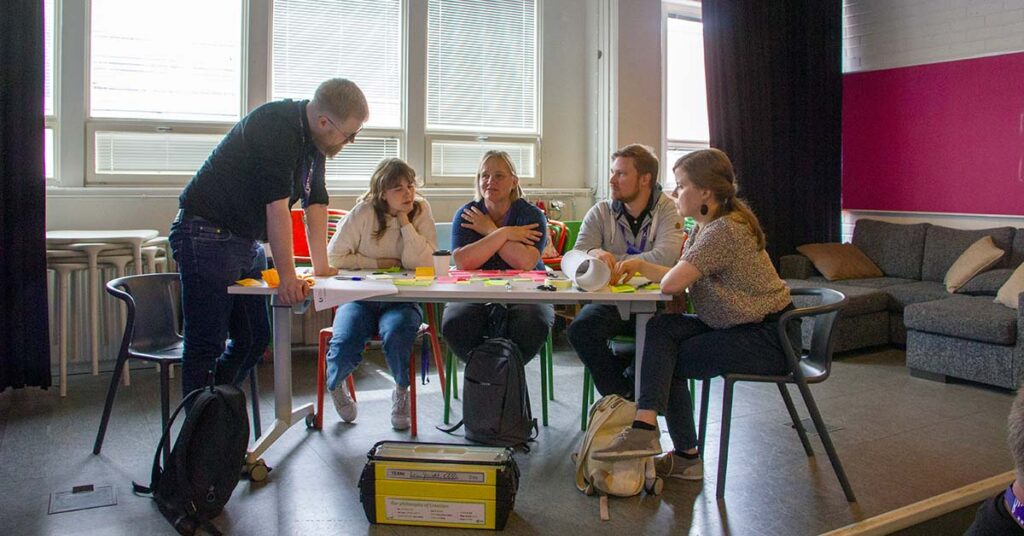
LUMA coordinators working at an innovation workshop during the LUMA Days in Otaniemi in 2022.
9. Personnel of the LUMA-centres
Aalto University Junior
Veli-Matti Ikävalko, manager
Riikka Keto-Tokoi, specialist in technology education
Pilvi Saaristo, visit coordinator
Greta Salonen, event and communications coordinator
Heidi Sillanpää, STEM and technology coordinator
Heidy Tiits-Tikkanen, art and entrepreneurship coordinator
Ilkka Tittonen, representative of LUMA Centre Finland/chair of the steering group
In addition, roughly 35 student assistants
Science education at the University of Helsinki
Anne-Maria Ernvall-Hytönen, associate professor
Outi Haatainen, postdoctoral researcher, from 1 August
Topias Ikävalko, specialist
Lea Kutvonen, senior university lecturer
Joonatan Kölhi, research assistant
Antti Laaksonen, university lecturer
Maaria Linko, director of the academic outreach network
Veera Lupunen, coordinator
Liisa Niemi, research assistant
Maija Nousiainen, university lecturer
Reija Pesonen, coordinator
Noora Pyyry, assistant professor
William Smolander, doctoral researcher
Pinja Tolvanen, project planner
Heli Virtanen, doctoral researcher
Karoliina Vuola, doctoral researcher
Emmi Vuorio, doctoral researcher
In addition, other research assistants and instructors of the science classes actively contributed to the operations.
LUMA Centre of the University of Eastern Finland
Mervi Asikainen, director of the LUMA Centre
Mikko Kesonen, LUMA coordinator, until 31 July 2022
Justus Kinnunen, project planning officer
Saana Kinnunen, project planning office, LUMA coordinator from 1 August 2022
Anssi Korhonen, teaching assistant
Juho Tiainen, project planning officer
Junior University
Nina Herttuainen, LUMA coordinator, LAB
Leena Ikonen, LUMA coordinator, LUT
Päivi Kuosmanen, deputy member of the board of the LUMA Centre Finland network and supervisor of the school collaboration team
Johanna Naukkarinen, member of the board of the LUMA Centre Finland network and chair of the LUMA coordination group
Maiju Rintakumpu, planning officer in the LUMAn lumoa and VakaDigi projects
Hourly-paid LUMA assistants (15 at LUT and 6 at LAB)
LUMA Centre of Central Ostrobothnia
Ismo Hakala, director
Pentti Impiö, senior planning officer
Mikko Myllymäki, research coordinator
Tommi Nurmi, university teacher
Central Finland LUMA Centre
Anni Aroluoma, coordinator
Joni Johansson, trainee
Anniina Koliseva, coordinator, on leave of absence until 31 December 2022
Jan Lundell, director
Asmo Roponen, LUMAn lumoa project
LUMA Centre of Southwestern Finland
Jussi Heinonen, project researcher
Sanna Launiainen, LUMA coordinator, from 1 June
Olli Lintu, LUMA coordinator, until 30 June
Laszlo Major, director
Pasi Nurmi, unit director
Henna Pesonen, LUMA coordinator, until 30 June
Matleena Tuomisto, LUMA coordinator
Additional student instructors
LUMA Centre Lapland
Partow Izadi, LUMA specialist
Ulla Kemi, LUMA specialist
Saara Krook, LUMA coordinator, from 1 August
Pekka Muotka, LUMA coordinator until 30 July, LUMA operator from 1 August
Anna-Maija Partanen, director, until 30 April
Pieti Tolvanen, director, from 1 May
LUMA Centre of Ostrobothnia
Hanna Hankaniemi, on leave until 18 September, LUMA coordinator from 19 September
Outi Kaarela, LUMA instructor, from 10 January
Kukka-Maaria Kallio, LUMA instructor
Janne Koljonen, director
Saara Lehto, LUMA instructor, from 10 January
Saana Söderlund, substitute LUMA coordinator until 18 September, LUMA instructor from 19 September
Aleksi Välisuo, non-military service, from 22 August
LUMA Centre of the University of Oulu
Kati Kyllönen, planning officer
Jouni Pursiainen, director
LUMA Centre Päijänne Tavastia
Olga-Sofia Alitalo, specialist, on leave of absence from 15 November
Maria Heikkilä, specialist, from 1 August
Tarja Kariola, director, from 1 March
Noora Kivikko, specialist
Jarkko Lampiselkä, director, until 28 February
Veera Pukkila, specialist
Suvi Simpanen, specialist, from 1 August
Anna-Roosa Vesanen, specialist, until 30 June
Moona Vilen, specialist, from 1 August
Skolresurs at Åbo Akademi University
Christian Ahläng, operations coordinator
Katarina Drugg, financial affairs
Ann-Catherine Henriksson, administrative coordinator in the LUMATIKKA project
Linda Karvonen, administrative coordinator
Niklas Ollila, translator
Bengt-Johan Skrifvars, director of operations
Ronald Österbacka, chair of the Skolresurs steering group
Juniversity at Tampere University
Tuulikki Harsia, specialist, on a 30% part-time basis
Susanna Kaitera, specialist, from 27 October
Laura Salkonen, senior specialist
Pekka Verho, representative of Tampere University on the Board of the LUMA Centre Finland network, chair of the LUMATE committee
In addition, 10 part-time science education instructors from 1 May to 31 December 2022.

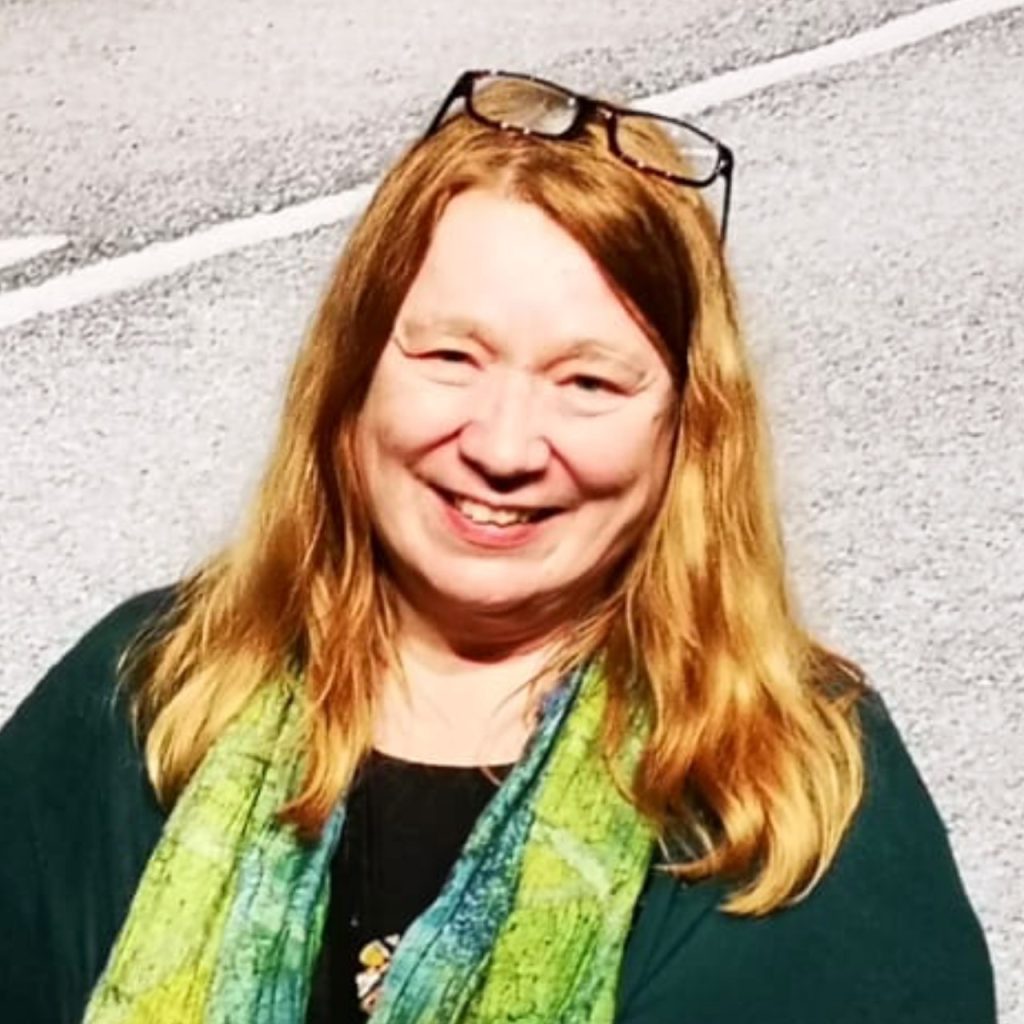
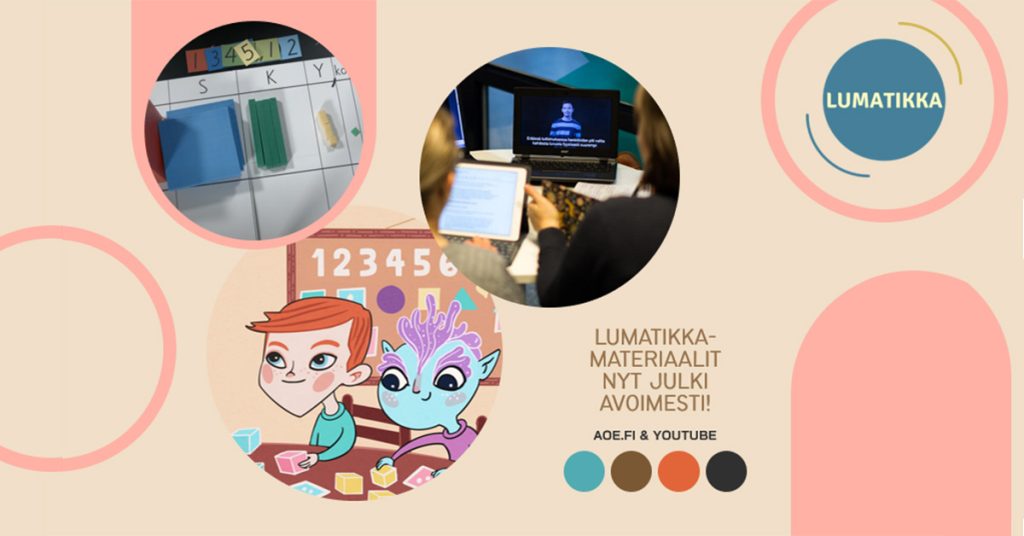 In late 2022, the popular LUMATIKKA project materials were made available online free of charge to all.
In late 2022, the popular LUMATIKKA project materials were made available online free of charge to all.